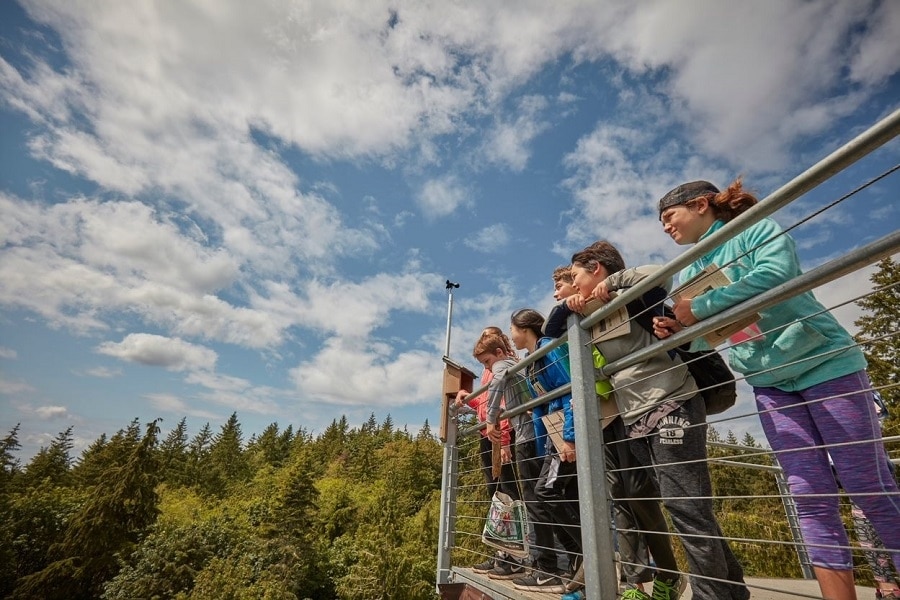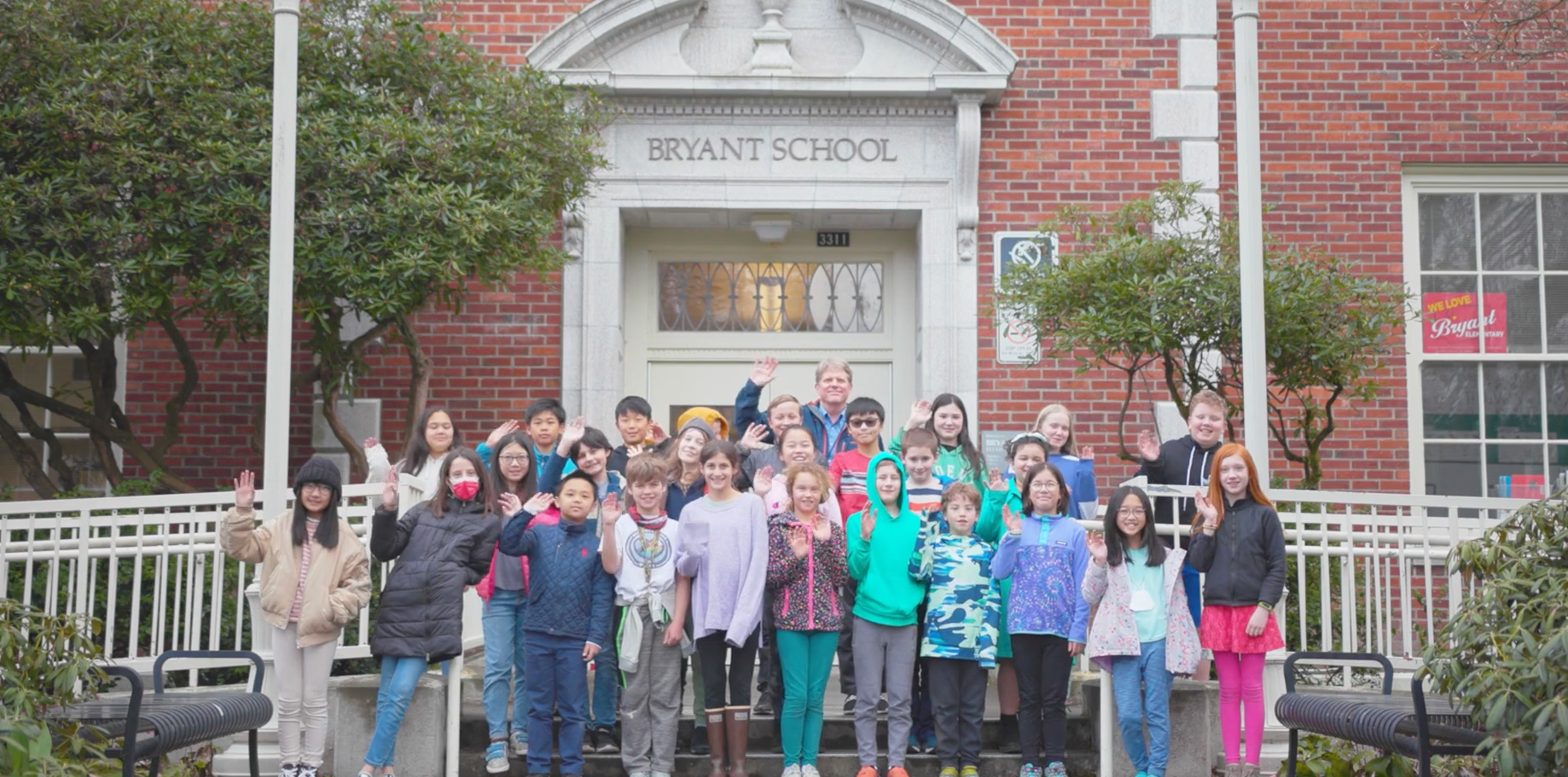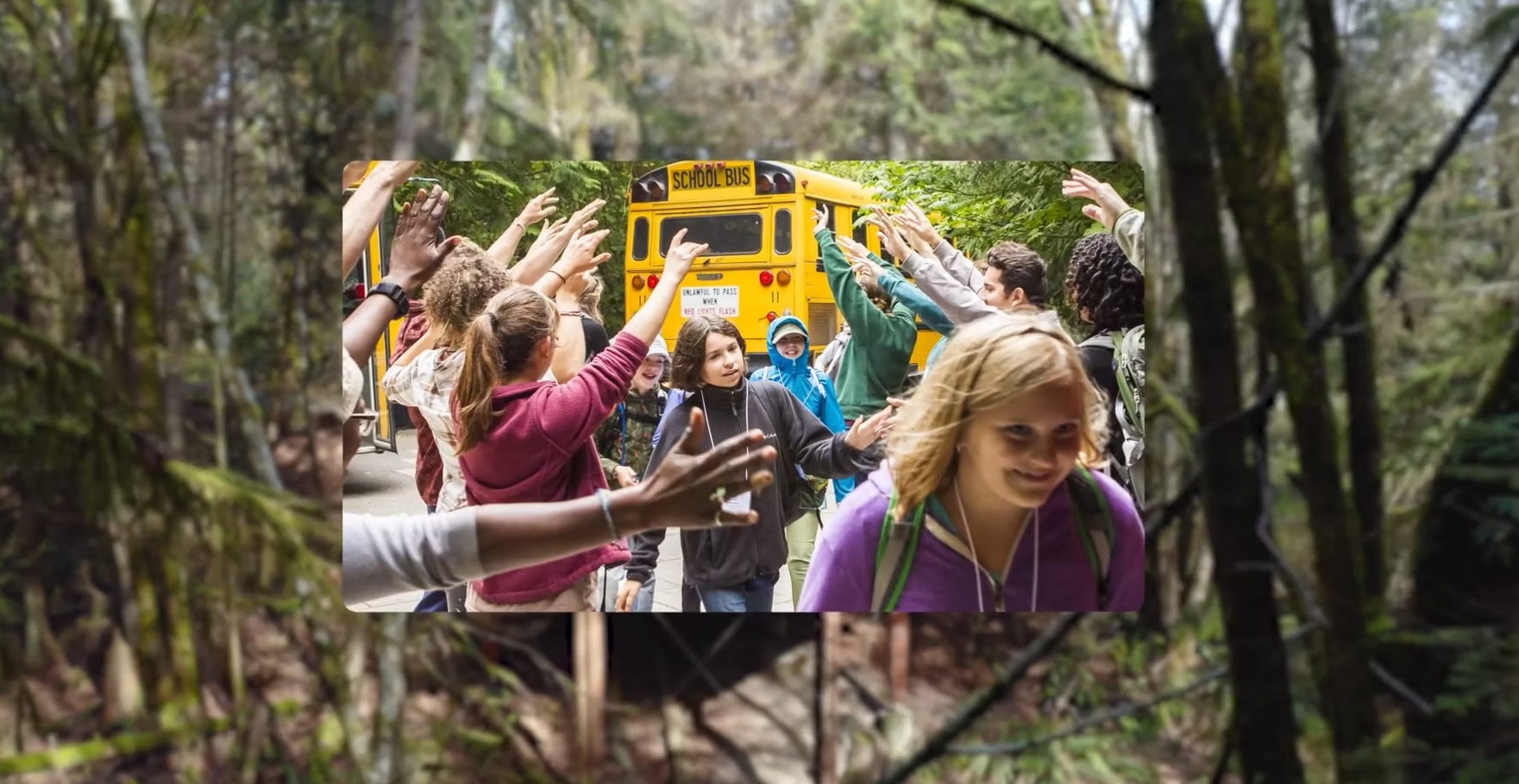Bryant Elementary was one of the schools included in our pilot program of the School…
This September marks the 16th anniversary of IslandWood’s first academic year. We sat down with Chief Administrative Officer/Chief Financial Officer, Laurie Miller, to find out what’s changed and what’s kept her here after all these years.
Since IslandWood was founded, its reach has expanded far beyond our Bainbridge-based programming. Can you talk about these programs and how they came to be?
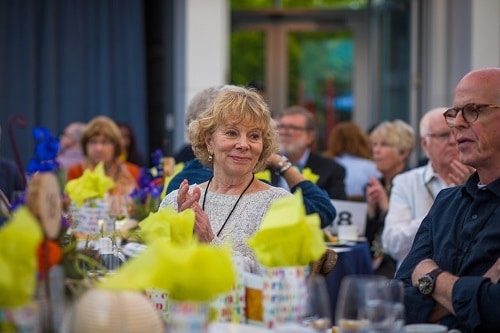
Chief Financial Officer/Chief Operating Officer Laurie Miller, clapping during Dinner in the Woods.
When the 2008 financial recession hit, our focus shifted to sustainability rather than growth. The value of our endowments declined and contributed revenue was flat. We used that period of time to really think about what IslandWood was going to do next: expand our footprint or go deeper on the island. The board chose expansion.
Our first foray was the Homewaters Project – which delivered field studies of urban watersheds in partnership with Seattle Public Schools. North Seattle Community College, which had been hosting the Homewaters Project, was going to end its affiliation with the program and Homewaters staff approached us about joining forces. This was a big decision for us and we did a full risk assessment. We eventually decided to absorb the Homewaters staff and work in 2010.
That decision started us on a bigger set of programs. Within a year, we subleased office space on First Ave in Seattle and began negotiations with King County to provide educational programming at the soon-to-launch Brightwater Wastewater Treatment Plant in Woodinville. All this work rolled into what is today the Urban School Programs, which also oversees teacher training and curriculum development.
Then, in 2014, IslandWood and Antioch University Seattle launched the Urban Environmental Education Master’s Program (UEE) in Seattle. Sadly, we haven’t been able to attract enough students to make that program financially viable and have decided to end the partnership with Antioch after the 2018-19 school year. In spite of this, we remain fully committed to the values of that program and to graduate education in general.
In each of the things we’ve tried, including the UEE program, we have learned a lot. Our urban work increased the urgency to use a social justice lens in everything we do in a way that might not have happened if we had opted to stay small and island-based.
It’s important to remind ourselves that our willingness to take risks has allowed us to grow and be on the forefront of environmental education.
How has the Bainbridge Island campus evolved since first opening? What is new and different?
We were still finishing buildings when I started, and we spent a lot of time working out the kinks and developing systems. Those early years were fraught with mechanical failures. [laughing]
Through our second capital campaign we added another guest lodge, a lodge for graduate students, and a laundry facility that allowed us to increase the number of kids and adults we can serve on-site. This paved the way for our School Overnight Program and our residential Graduate Program to double in size over the years. It also allowed us to grow our Weddings and Retreat business beyond our expectations and generate critical revenue to fund our educational programs.
Having more people on site put pressure on our living machine – an ecological waste water treatment system – which was upgraded. And we built a second treehouse.
The original business model didn’t anticipate staff growing as much as it has – from just 25 staff in 2002 to over 100 today – and eventually we had to convert the storage loft into office space. John Haskin’s [SVP of Education] office is a former storage closet. All our IT systems also had to change and grow. These are things that nonprofit organizations don’t necessarily plan for.
Today, one of the core philosophies of IslandWood’s work is that teaching be done in a culturally-responsive manner – meaning that educators honor and value the cultural context and ways of knowing that students already bring to the learning. Why does IslandWood believe this is important?
I think there was always the intention of being culturally responsive, though I’m not sure we – or at least I – have always understood what that meant. Initially there was a focus on equitable access to our programs through scholarship endowments and by subsidizing schools to attend. But we may not have understood why issues of justice, diversity, inclusion, and equity needed to be centered in the conversations we were having, the decisions we were making, or embedded explicitly within our graduate program.
Our growth, my growth, has been largely driven by a few staff, as well as graduate students and alumni, who have kept pushing us, and I would say by a larger social awakening that is happening as well. Today, our programs use a social justice lens, and equity is becoming a more explicit and intentional focus of our campus graduate program. We are also working at a leadership level to articulate why this work is an imperative for achieving our mission and to set organizational goals for centering race equity in our policies, operations, and practices. We have a long journey ahead and lots of work to do, but the pace of that work is accelerating.
What have been some of the biggest successes over the last 16 years and what do you attribute them to?
IslandWood is increasingly recognized as an innovator and a leader in environmental education. Much of this is because we have been willing to push our own boundaries, like getting more involved with advocacy. The truth is that pushing our boundaries has been hard and we’ve struggled mightily with certain things. I also think it takes courage to be willing to question and push ourselves beyond our comfort zone. It certainly would have been much easier to stay a small outdoor learning center on Bainbridge Island.
What excites you about where IslandWood is headed in the future?
I think we have found our focus – To be a leader in innovative and inclusive education for the planet – and are working on our theory of change based on that focus. Those two pieces will give us the strong guardrails we need to make strategic decisions about future growth. It’s taken us 16 years to get here. That may sound like a long time but isn’t that long in an organization’s history.
I’m also excited to embark on a refresh of our campus graduate program to reflect the best of what we’ve learned over the last few years, more explicitly address equity, and ensure its sustainability, relevance, and impact.
In your 16 years at IslandWood, what has made you most proud?
That we’ve been willing to push our boundaries; and unwilling to be okay with the status quo – including addressing social justice in staffing, operations, and programs – no matter how uncomfortable that makes us.
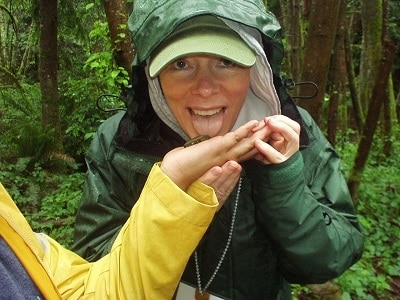
Chief Financial Officer/Chief Operating Officer Laurie Miller, sticking out her tongue to lick a slug.
Any favorite stories or experiences from over the years you’d want to share?
I remember when we had a big snow storm once during the School Overnight Program and the kids couldn’t go home on the day of their scheduled departure. Those of us staff who could get to campus or who were already on campus hunkered down and spent the night. John [Haskin] brought his guitar and sang songs. Everyone chipped in, working around the clock. It was a shining example of the kind of community we have.
I also laugh to think back at how worried we were that we were making a radical decision by acquiring Homewaters. Today, our Urban School Programs are such an integral part of who we are. It’s hard to imagine IslandWood without them.
It’s increasingly rare to find someone who has worked at any single organization or company as long as you have been at IslandWood. What has kept you engaged for almost 16 years?
There is never a day I do not want to go to work. The culture, the professionalism, the pursuit of excellence, the willingness to keep testing has made it energizing, fun, and challenging on a daily basis.
If IslandWood had chosen the path to hunker down on Bainbridge Island, it wouldn’t have suited me. The fact that we continue to uncomfortably push the boundaries makes the work energizing.
My mom and dad were “radical” conservationists who cared deeply about saving land and wilderness. It would have been fun to have a conversation with them about how we’re thinking about environmental education and the environment in a much broader way.

